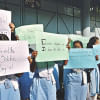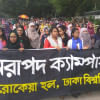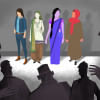When our victim-blaming culture shrouds predators as teachers

I remember being in seventh grade when I was protesting in front of the college gate of my alma mater Viqarunnisa Noon School and College. The protest was staged for the expulsion of Porimol Joydhor, a former teacher who had raped a classmate from another branch, and the suspension of the then principal Husne Ara Begum for her attempts to cover up the whole incident.
Thankfully, for all the noise we had created back then, the principal was removed from her post soon after, and the courts sentenced Porimol to life-term imprisonment.
The year was 2011.
History has repeated itself this year, involving a similar predator with a different name—Murad Hossain Sarkar, a mathematics teacher at the institution's Azimpur branch.
During a protest rally, students came forward with allegations that for years, Murad has been sexually harassing their peers, a truth they refrained from disclosing out of fear. A report by Dhaka Tribune revealed the harrowing account of a former student who preferred to be anonymous. Murad used to single out one or two students from every batch for his predatory behaviour. In the guise of extra coaching, he found pretexts to keep these targeted individuals behind, subjecting them to sexual harassment.
Now, the students' collective outcry is for the administration to mete out exemplary punishment to Murad Hossain Sarkar, to serve as a stern warning against such reprehensible acts.
This past Thursday, Murad was incarcerated, leaving us grappling with a significant concern: how can students regain a sense of safety within their classrooms? Furthermore, it raises the question of why the premier girls' school in the nation is struggling to create an environment where students feel secure enough to voice concerns about harassment.
Tracing back to history, I remember glimpses of how the school at that time dealt with the aftermath of protests against Porimol. Few teachers had resorted to victim blaming, questioning the victim's intentions or why she was in that sort of a position in the first place. Comments such as "Ek haate taali baaje na (you can't clap with just one hand)" used to be made in various discussions at coachings. Many male teachers started to passively joke about how they are afraid to conduct themselves around students with the charges circulating. The aunties had made sure that their daughters had an orna wrapped around their neck, as if that would protect them from further harassment. Some of my classmates made conspiracy theories about how the victim was "involved in an affair" with the teacher and is now just crying wolf. But they were just kids; they didn't know any better. What about the adults though?
The common denominator of the situation is that the victim is held responsible for her own abuse, not the perpetrator. And while this may surprise you that these practices still persist in such a reputed and historic institution, I'm disheartened to tell you that this is a culture I've witnessed spending 12 years at the institution, which is why I'm not even surprised that 13 years since Porimol's case, the students of Viqarunnisa are going through the same cycle. Let me explain the possible reasons behind this persisting issue.
There's a concept of being a bhalo meye (good girl) that's often used by teachers in the classroom. A bhalo meye is a girl who studies hard to become a doctor or dreams of studying in a public university, respects her teachers despite their flaws, whose sole focus and definition is her grades. She dresses modestly and is quaint, never assertive. She doesn't talk back and certainly doesn't question authority or societal norms. Therefore, anyone who doesn't fit this mould is termed a beyadob (a person without manners).
Schools play a crucial role in shaping young minds. Yet, in our society, instead of fostering a culture that celebrates authenticity and encourages self-expression, there exists a troubling trend of teaching girls to be submissive. This educational approach has profound implications on the development of young girls, moulding their personalities during a formative period. When schools prioritise compliance over individuality, it enables an environment where speaking up is not just discouraged but often penalised. This teaches girls from a young age that their voices are less valuable, impacting their self-esteem and diminishing their belief in their ability to effect change.
How did the institution change after the 2011 incident? A complaint box was placed at the school's entrance, which was hardly ever opened. As a student, I found it quite cynically hilarious, and as an adult I still do, only with the introspection of how issues of assault in educational institutions of our country are dealt with tokenistic responses like complaint boxes or sexual harassment cells that give institutions a "get out of jail free card" and leaves victims even more unassured of their safety.
There are also other problems that may have passively contributed to the scenario. The quality of education at the institution is significantly influenced by challenges related to faculty management and hiring practices. During my time there, I observed incidents of many dedicated and skilled teachers choosing to leave due to the prevalence of internal politics affecting promotions. This not only resulted in the loss of valuable educators but also highlighted the systemic issues within the institution's administrative processes. The teachers who opted to stay faced ongoing challenges, often feeling compelled to remain silent about the institutional realities to keep their job.
Furthermore, the recruitment process in recent years is also questionable since most hiring decisions appear to be influenced by nepotism or political affiliations, specifically connections with either the institution's governing body or local political entities.
What I'm describing isn't just an isolated situation for Viqarunnisa. Take the school's name out of the equation and put the names of Dhaka University or Jahangirnagar University or the many other institutions reeling from sexual harassment charges, and you'll find traces of a similar rot in the system.
A 2021 study by Plan International revealed that around 74 percent female students in Bangladesh face violence and harassment at educational institutions. And yet, there has been little to no change in making recruitment processes strict and meritocratic, enforcing mandatory background checks on educators, or implementing comprehensive training programmes on gender sensitivity and harassment prevention. This inertia not only perpetuates a culture of impunity but also undermines the fundamental rights of students to learn in a secure and nurturing setting.
The consistent neglect of essential safety and equality measures within Bangladesh's educational system is more than just oversight: it's a clear sign of entrenched complacency that demands urgent, courageous reforms. It's time for the system to abandon outdated excuses and embrace a new curriculum of action, one that guarantees every student a secure and fair learning environment.
Nazifa Raidah is a member of the editorial team at The Daily Star. Reach her at [email protected]
Views expressed in this article are the author's own.
Follow The Daily Star Opinion on Facebook for the latest opinions, commentaries and analyses by experts and professionals. To contribute your article or letter to The Daily Star Opinion, see our guidelines for submission.

 For all latest news, follow The Daily Star's Google News channel.
For all latest news, follow The Daily Star's Google News channel. 











Comments